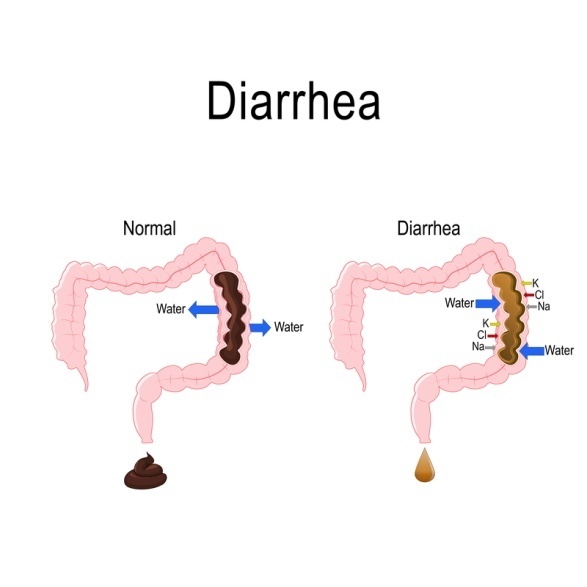Diarrhoea is one among the foremost common health complaints. It will vary from a light, temporary condition, to a probably critical one. Globally, an estimated 2 billion cases of diarrheal disease occur each year, and 1.9 million children under the age of 5 years, mostly in developing countries, die from diarrhea.
Diarrhoea is known to be unusually loose or watery stools. Some individuals often pass stools, however they’re of traditional consistency. This is not diarrhoea. Similarly, breastfed babies often pass loose, pasty stools. This is normal. It is not diarrhea.
Here are some key points about diarrhoea: Generally all cases of diarrhea are result of bacteria, viruses, or parasites.
Inflammatory bowel diseases (IBD) including Crohn’s disease and ulcerative colitis can cause chronic diarrhoea.
Ant diarrhoeal medications will cut back diarrheic output and Zn supplement is effective in kids.
Some biological process and probiotic interventions might facilitate in stopping diarrhoea.

Causes
Water: Correcting dehydration is the priority of diarrhea treatment. Most cases of diarrhoea are caused by an infection within the alimentary tract. The microbes responsible for this infection include: Bacteria, viruses and parasitic organisms.
The most commonly identified causes of acute diarrhoea are the bacteria Salmonella, Campylobacter, Shigella, and Shiga-toxin-producing Escherichia coli. Some cases of chronic diarrhoea are called “functional” because a clear cause cannot be found. Irritable bowel syndrome (IBS) is the most known cause of functional diarrhoea. IBS is a complex of symptoms. There is cramping abdominal pain and altered bowel habits, including diarrhea, constipation, or both.
Inflammatory bowel disease (IBD) is another explanation for chronic diarrhoea. It is a term used to describe either ulcerative colitis or Crohn’s disease. There is usually blood within the stool in each condition. Other major causes of chronic diarrhoea include:
Microscopic colitis: this can be persistent diarrhoea that typically affects older adults, usually throughout the night.
Malabsorptive and maldigestive diarrhoea: The first is caused by impaired nutrient absorption, the second by impaired digestive function. Celiac disease is one example.
Chronic infections: Histories of travel or antibiotic use are often clues to chronic diarrhoea. Various bacteria and parasites can be the cause.
Drug-induced diarrhea: Laxatives and alternative medication, including antibiotics, can trigger diarrhoea.
Endocrine causes: typically secretion factors cause diarrhoea, for example, in the case of Addison disease and carcinoid tumors.
Cancer causes: growing diarrhoea is the key to a lot of gut cancers.
Symptoms
With stomach cramps, symptoms of diarrhoea can include bloating, thirst, and weight loss.
Diarrhoea refers to watery stools, but it may be accompanied by other symptoms like:
Stomach pain
Abdominal cramps
Bloating
Thirst
Weight loss
Fever
Diarrhoea may be a symptom of alternative conditions, some of which can be serious.
Complications
Two potentially serious complications of diarrhoea are:
- Dehydration, with acute or chronic diarrhoea.
- Malabsorption, with chronic diarrhoea.
Treatment
Mild cases of acute diarrhoea might resolve without treatment. Persistent or chronic diarrhoea are going to be diagnosed and any underlying causes are going to be treated according to the symptoms of diarrhoea.
Dehydration: For all cases of diarrhoea, rehydration is the key.
Ant diarrheal medication: Loperamide, or Imodium, is an antimotility drug that reduces stool.
Antibiotics: they are only used to treat diarrhoea caused by a bacterial infection.
